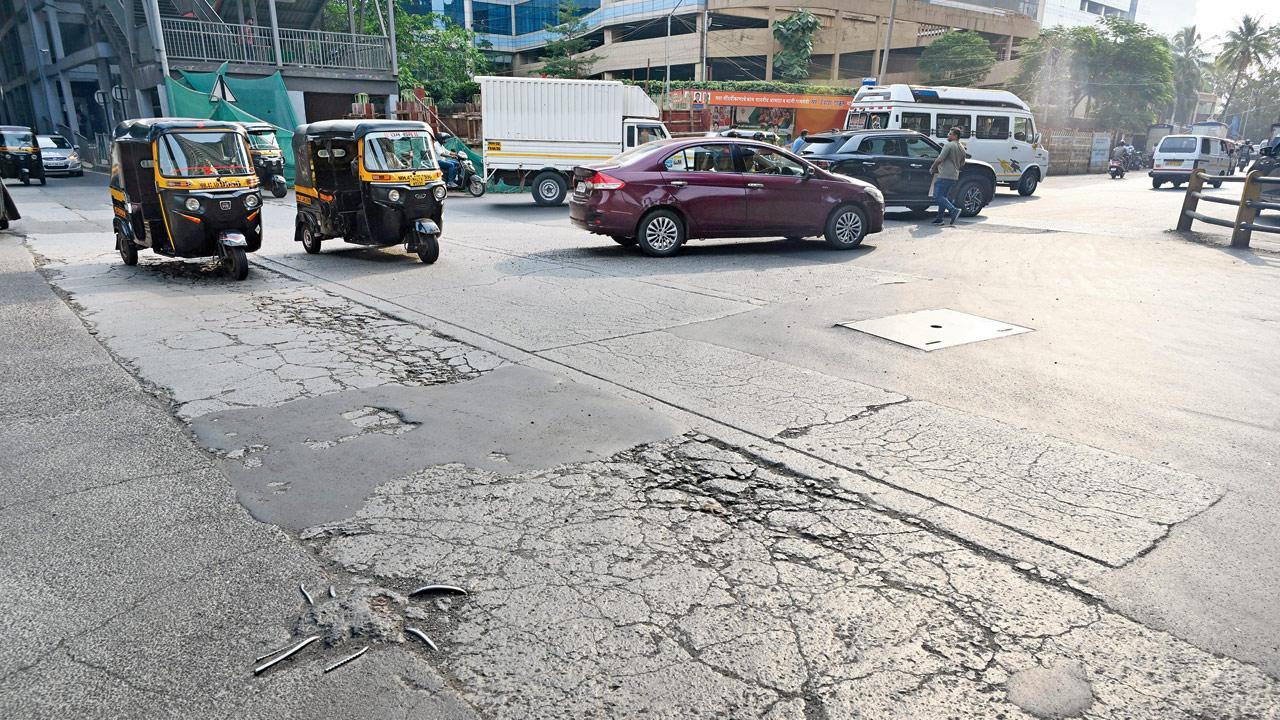Of the 18,499 potholes reported in city between June and August, 42 per cent were found on both highways, including service roads

Damaged service road in Goregaon. Pic/Anurag Ahire
The concreting of shabby service roads adjacent to both highways is part of a larger project to concrete the entire Western Express Highway (WEH) and Eastern Express Highway (EEH) in phases over the next few years. The service roads will serve as additional lanes for heavy vehicles and will facilitate access to the main carriageway.
ADVERTISEMENT
The BMC issued a tender on September 23, with an estimated cost of Rs 1,591 crore to concrete approach roads totalling 44 km in length that connect both highways to major and minor roads in the city. Although there is debate over whether to concrete service roads, which are less utilised than main roads and often trenched due to utilities underneath, it is revealed that the concreting of service roads is not the ultimate goal but rather the initial step in the larger project to convert both highways into concrete roads, which are currently made of asphalt.
These service roads are filled with potholes, and since the highways are used by heavy vehicles, the need for repair is urgent. Earlier this year, in May, the BMC floated a Rs 146 crore tender for pre-monsoon repair works on the two highways. Out of 18,499 potholes reported across the city between June and August, approximately 42 per cent (7,754 potholes) were identified on both highways, including service roads. “Many stretches of service roads carry almost equal numbers of vehicles. They also accommodate utilities and are frequently dug up. There are complaints about uneven patches as well, so urgent repair is needed. If we only repair entire stretches with asphalt, we will eventually need to concrete them later, as that is the only way to prevent permanent damage to the road surface,” said an official from the BMC Road Department.
Abhijeet Bangar, additional commissioner of the BMC, explained, “The WEH and EEH do not urgently need repairs, but their defect liability period has ended, and in the next few years, the highways will be converted to cement concrete in phases by closing one lane at a time. Concrete service roads will help divert traffic during the reconstruction of the highways.” The BMC has already partnered with the Indian Institute of Technology (IIT) Bombay to ensure the quality of city roads. The institute will conduct quality control checks of the cement concrete road works, including cube tests, core tests, slump cone tests, durability tests, and field density tests, along with surprise visits, site inspections, and feedback sessions.
A principal scientist at the Central Road Research Institute, which conducts fundamental research in sustainable technologies for roads and smart transport, stated that they conduct research based on the requirements of client institutions and submit reports accordingly. If the BMC seeks their services, it will be considered. The contract period for concreting of service roads is 24 months, excluding the monsoon season. The scope of work includes civil works, concreting works, construction of stormwater drains, ducts, footpaths, and allied works.
Abhijeet Bangar stated that there are two options for road construction: either we can maintain asphalt patches for trenching or lay ducts. We receive complaints about asphalt passages being in poor condition, causing the entire road to be labelled as bad. Instead, we can install ducts to accommodate utilities while coordinating with the relevant agencies. However, the service charges for digging concrete roads are almost ten times higher than those for asphalt, making it less likely that companies will dig without a valid reason.
Mumbai currently has a road network of 2,050 km, of which 1,224 km is already concreted. Last year, the BMC awarded contracts to concrete 397 km of roads worth Rs 6,089 crore. This year, the process is in the final stages of awarding contracts worth R6,200 crore for the remaining roads.
BMC took over both highways
The EEH and WEH were taken over by civic authorities from the Mumbai Metropolitan Region Development Authority (MMRDA) for maintenance in 2022. The Eastern Express Highway is 23.55 km long, stretching from Mulund to Sion, while the Western Express Highway runs 25.88 km from the suburb of Dahisar to Bandra. The total length of the approach roads is 44 km.
 Subscribe today by clicking the link and stay updated with the latest news!" Click here!
Subscribe today by clicking the link and stay updated with the latest news!" Click here!







